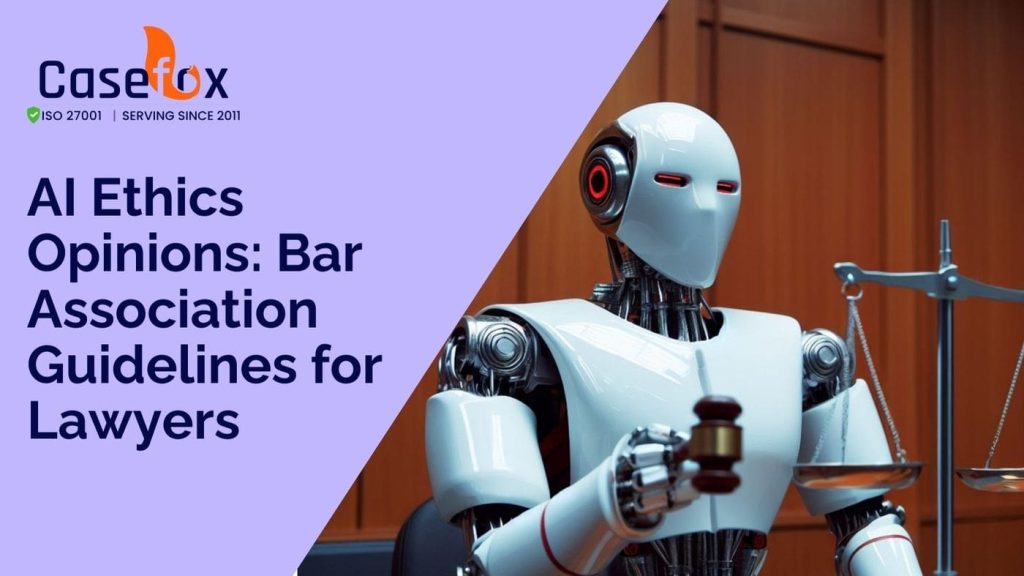What is holding you and your firm back from using AI tools? For many lawyers and firms, the answer is the fear of not knowing AI ethics and guidelines. Additionally, they don’t know whether their bar association approves AI in legal practice.
While AI will not replace lawyers, it can surprisingly help them to a greater extent. As per one study, more than 90% of respondents said “no” or “do not know” when asked if their law firms had provided information about their use of AI.
The introduction of AI tools into your legal practice can be game-changing, but it’s important to consider AI ethics. The Florida Bar Association recently provided clarity on how they can use AI for legal practice without going against AI guidelines and ethics. Let’s explore more about this further in the blog.
What the Florida Bar’s AI Ethics Opinion Suggests for Lawyer AI Use?

The Florida Bar released an advisory on AI ethics opinion, Opinion 24-1, on January 24, 2024, which covers ethics surrounding AI use. The AI ethics opinion states that lawyers can use AI for legal practice but they should not get involved in unethical practice while using AI tools.
Prioritizing Client Confidentiality
Lawyers who use AI should ensure that they protect their client’s confidentiality. Their personal information should not be compromised while using any generative AI tools. Lawyers should educate themselves about the use of AI, data handling, and sharing of sensitive information.
However, lawyers aren’t required to obtain their client’s consent to use AI in relation to their cases. But if they might be disclosing any personal information about the client, they will have to inform the client about doing so.
Practicing Accurately and Competently
AI and lawyer can be the perfect combination but not in unethical work. At the end of the day, lawyers are responsible for their work, even if they are using AI for it. So, it is important for attorneys to review the task that is done by AI.
This is to ensure the accuracy of the work, additionally, it should also be sufficient for their clients’ purposes. Furthermore, Opinion 24-1 confirms that lawyers may not delegate any tasks to AI tools that could constitute the practice of law (for example, negotiating a settlement).
Steering Clear of Unethical Billing Methods

Today, the legal industry is booming with AI tools and software. Lawyers and firms might be using AI tools to save time on routine legal tasks. However, they must bill honestly and accurately and avoid unethical billing practices.
They should review the bills generated by the AI tool, this is to avoid any type of double billing or inflated billing. Additionally, if they want to charge clients for the use of AI, they must notify clients beforehand.
Complying with Lawyer Advertising Restrictions
Lawyers already have few restrictions when it comes to advertising. But they should be extra cautious when they are using AI to assist with advertising and intake—namely, where the use of AI chatbots is concerned. The clients should be aware that they are communicating with AI tools and they can’t share personal or sensitive information. Lawyers will be held responsible for it.
Why are Bar Associations issuing AI Ethics Opinions?
Here are a few reasons why bar associations are issuing AI ethics opinions:
- AI tools might require some personal information regarding clients that lawyers are not supposed to share, which is why bar associations are issuing AI ethics opinions and safeguarding their personal data.
- Bar associations are also doing this to make legal practice more transparent. Clients have all the right to know if their lawyers are using any kind of AI tools and technologies while working on their cases. The bar association encourages lawyers to disclose AI representation in their clients’ roles.
- Bar associations are issuing ethics opinions to ensure lawyers are on track and not doing something unethical that can cause them their legal practice and clients.
Have Other State Bar Associations Released AI Ethics Opinions?

Yes, apart from Florida Bar, there are other bar associations too that have released some guidelines regarding the use of AI in state and legal ethics related to AI use. The other bar associations that did the same are Michigan, California, and New Jersey. Some of the bar associations, including New York, Texas, Illinois, New Jersey, Minnesota, and Kentucky, are still examining how lawyers can use the emerging technology.
What Should I do if my State has not Issued an AI Ethics Opinion?
If you want to use AI tools and technologies in your legal practice but your state bar has not issued any guidelines regarding it. It’s prudent to follow the guidance provided by Florida and the bar associations and other state bars that we have mentioned above. For the most part, the guidelines provided by bar associations are most common enough to be relevant regardless of your jurisdiction’s specific rules.
Make sure you are checking the bar association’s rules of professional conduct to confirm whether any AI-related activities are allowed by your association or not. Stay updated regarding your association with AI ethical considerations. If you still want to use AI, ensure that your state bar has not prohibited it and you can use it without being unethical. Be mindful of the use of AI in your legal practice.
Final Thoughts on AI Ethics
AI in the legal industry is undoubtedly transforming the legal practice of lawyers and firms. Using AI to save time and automate certain legal tasks can be helpful for lawyers, but it is important to use the tools responsibly. Even if your state bar has not provided any regulations and guidelines regarding AI use, you should still follow basic legal ethics regarding the use of AI. As AI technology evolves, more and more bar associations will come up with rules and guidelines regarding it.
This blog was just a starting point for the AI ethics conversation in the legal industry. There is a lot to be done regarding the use of AI. It is necessary to keep in mind that, as a lawyer, you will be responsible for AI issues and inaccuracies, so make sure to review the tasks and data provided by AI tools.

